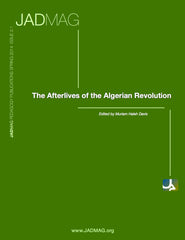Al-Diwan Roundup: News and Analysis in Publishing and Academia from the Arab World

Al-Diwan brings you the latest news and analysis in publishing, academia, pedagogy, and knowledge production from across the Arab world.


Al-Diwan brings you the latest news and analysis in publishing, academia, pedagogy, and knowledge production from across the Arab world.


Edited by Muriam Haleh Davis

Tadween Publishing’s blog is transforming into Al-Diwan. The move attempts to capture the spirit of a shift towards creating an open space for discussion.




Edited by Noura Erakat
This pedagogy publication examines the November 2012 military offensive and unpacks historical legacies, legal questions, media portrayals, and political considerations. In doing so, the publication helps create a context for the attack and considers possibilities for the future of the conflict and the balance of power in the Middle East more generally.




Noura Erakat and Mouin Rabbani, editors, Aborted State? The UN Initiative and New Palestinian Junctures. Washington, DC: Tadween Publishing, 2013.

Aborted State? The UN Initiative and New Palestinian Junctures
Edited by Noura Erakat and Mouin Rabbani
This book examines the Palestinian UN initiative from the key perspectives of strategy and leadership; international law and statehood; US foreign policy; and representation. It also includes more recent material from the 2012 sequel to the 2011 initiative, and relevant appendices


كان هناك تاجر نشيط ومجدّ يمضي معظم وقته خارج البلاد ملاحقاً تجارته. وفي أثناء إحدى رحلاته، التي استمرت أكثر من عامين، وقعت زوجته في حبّ جار شابّ. لم يتمكّن العاشقان من السيطرة على عواطفهما المتأجّجة مما دفعهما إلى لقاء سريع، وأقاما علاقتهما بطريقة خرقاء، إذ إنه بعد مضيِّ حوالى تسعة أشهر، اكتشفت زوجة التاجر أنها حامل للمرة الأولى. وكانت دهشة التاجر لدى عودته إلى المنزل كبيرة حين اكتشف هذا المكسب الجديد للأسرة، وسأل زوجته إن كان الحمْلُ قد تم بفعل معجزة تجعلهما مدينين لها


Tadween recently interviewed David Hirsch, librarian for Middle Eastern Studies at the University of California, Los Angles, about the Tahrir Documents, a project which collected and translated material from the protests at Tahrir Square in Cairo. This interview is part of Tadween’s new campaign to highlight the role of universities in knowledge production and preservation.

Tadween Publishing brings you the latest news and analysis from the publishing and academic worlds that relate to pedagogy and knowledge production.

Technology continues to transform education all over the world. We have previously covered the issue of MOOCs, the use of technology in the classroom, and other issues of education and technology. But now we can see technology and education interact in quite an unlikely place: Twitter. The 140 character limit to tweets seems to conflict with the unending process of education. However, there are some signs that the Twitterverse is beginning to have an influence on pedagogy.

Tadween Publishing brings you the latest news and analysis from the publishing and academic worlds that relate to pedagogy and knowledge production.

By Ursula Lindsey
CAIRO–In an oft-cited reference, the UN-sponsored Arab Human Development Report painted a bleak picture in 2003 of the Arab cultural and academic landscape here. It described translation in Arab countries as “chaotic and static” and noted that “the aggregate total of translated books [into Arabic] from the Al-Ma’moon era to the present day amounts to 10,000 books – equivalent to what Spain translates in a single year.”

Tadween Publishing has compiled a list of blogs and websites that feature
news and analysis on education. Whether you are looking for news on how
technology is being integrated into the educational system, new innovative
styles of teaching, or updates on the battle for academic freedom, the
following list should be your guide.

By Steven Gertz
I now know what it is like to be profiled.
As an American white male of German descent, this is not something to which I am accustomed. For years, I have flown internationally with very little problem going through passport control (though Israel has been wary of my travels in the West Bank of Palestine). I have stood in numerous lines, smiled at customs officers, answered a few perfunctory questions (that I would wager tell customs officers very little about the passenger actually traveling) and been waived through with the desired stamp.